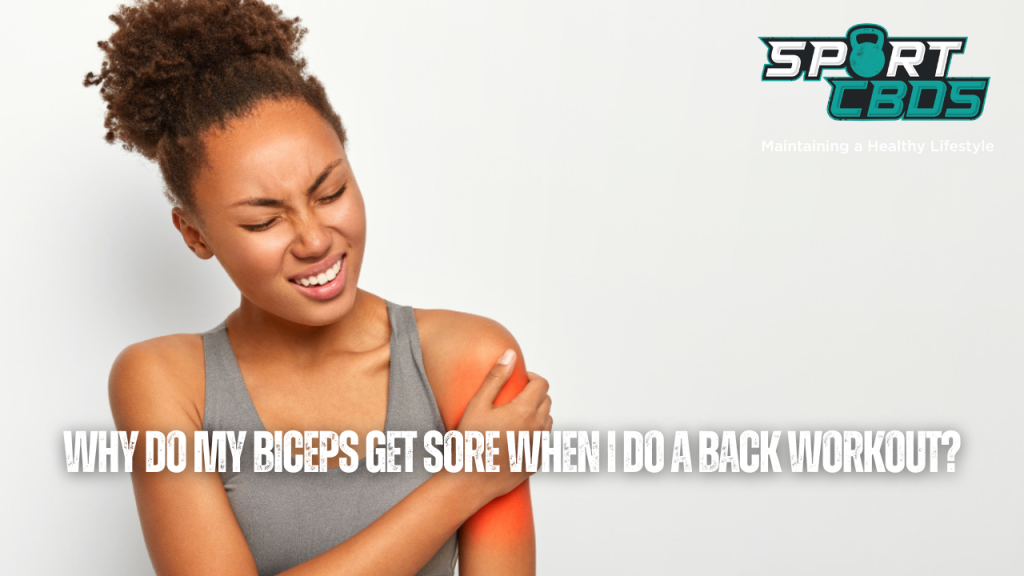
Why Do I Feel Tricep Extensions in My Shoulders? Why It Happens and How to Fix It
Tricep extensions are a popular exercise for strengthening the triceps, the muscles located at the back of your upper arm.
However, some people experience discomfort or pain in their shoulders while performing this exercise.
This article aims to explore the reasons behind this phenomenon and provide insights on how to prevent it.
Understanding the correct form and muscle engagement in tricep extensions is crucial not only for the effectiveness of the exercise but also for preventing potential injuries.
Why Do I Feel Tricep Extensions in My Shoulders?
Feeling tricep extensions in your shoulders can be attributed to several factors. One of the most common reasons is incorrect form, such as leaning forward or rolling your shoulders, which can put extra strain on your shoulders. Additionally, lifting too much weight can cause your body to compensate by engaging other muscles, like your shoulders. Tight muscles or immobile joints can also lead to strain and discomfort in your shoulders during tricep extensions. Furthermore, internal rotation of the shoulders or weak muscles can lead to unnecessary shoulder engagement. Lastly, incorrect form can lead to cuff injuries, a common cause of shoulder pain. By understanding these potential issues and implementing the correct form and techniques, you can help prevent shoulder discomfort during tricep extensions.
Understanding Tricep Extensions
Tricep extensions are a type of strength training exercise that targets the triceps brachii muscle. This muscle has three heads: the long, medial, and lateral head, all of which work together to extend the elbow.
Tricep extensions can be performed using various equipment such as dumbbells, barbells, resistance bands, or cable machines, and they can be done in different positions (standing, lying down, or overhead).
When performed correctly, tricep extensions primarily engage the triceps, with minimal involvement from other muscles. However, certain factors such as your form, the weight you’re lifting, and your body’s unique biomechanics can cause other muscles, like your shoulders, to compensate. This is often where problems start to arise.
- The triceps brachii muscle: This muscle is the primary mover in tricep extensions. It’s responsible for extending the elbow and plays a crucial role in movements like pushing and throwing.
- The deltoids: These are the muscles that make up your shoulder. They’re not supposed to be the primary movers in tricep extensions, but they can become involved if the exercise isn’t performed correctly.
- The latissimus dorsi (lats): These large muscles on your back can also become involved in tricep extensions, especially if you’re not maintaining proper form.
Understanding the roles of these muscles in tricep extensions can help you identify potential issues with your form or technique that might be causing shoulder discomfort. In the next section, we’ll delve into the common reasons why you might be feeling tricep extensions in your shoulders.
Common Reasons for Feeling Tricep Extensions in the Shoulders
There are several reasons why you might be feeling tricep extensions in your shoulders. Here are some of the most common ones:
Tight muscles or immobile joints: If your muscles are tight or your joints lack mobility, you may have to strain to get your arms into the correct position for tricep extensions. This strain can lead to discomfort or pain in your shoulders. Regular stretching and mobility exercises can help alleviate this issue.
Incorrect form or weak muscles: If you’re not performing tricep extensions correctly, or if your muscles are too weak, your body may compensate by engaging other muscles, such as your shoulders. Ensuring that you’re using the correct form and gradually building up your strength can help prevent this problem.
Leaning forward and shoulder rolling: If you’re leaning forward or your shoulder is rolling forward during tricep extensions, this can put extra strain on your shoulders. Maintaining a straight posture and keeping your shoulders back can help alleviate this issue.
Lifting too much weight: If the weight you’re lifting is too heavy, your body may compensate by engaging other muscles, such as your shoulders. It’s important to choose a weight that you can lift with good form for the recommended number of repetitions.
Internal rotation of the shoulders: If your shoulders are internally rotating during tricep extensions, this can lead to shoulder discomfort. Focusing on keeping your shoulders externally rotated can help prevent this problem.
Incorrect form leading to cuff injuries: Incorrect form during tricep extensions can lead to cuff injuries, which are one of the most common causes of shoulder pain. Ensuring that you’re using the correct form can help prevent these injuries.
Understanding these common issues can help you identify what might be causing your shoulder discomfort during tricep extensions. In the next section, we’ll delve deeper into the impact of poor shoulder mobility and tight lats on this exercise.
Related: Can I Skip Triceps from My Workout?
The Impact of Poor Shoulder Mobility and Tight Lats
Poor shoulder mobility and tight lats can significantly impact your ability to perform tricep extensions correctly and without discomfort. Here’s how:
Poor shoulder mobility: If your shoulders lack mobility, you may struggle to get your arms into the correct position for overhead tricep extensions. This can lead to strain and discomfort in your shoulders. Regular shoulder mobility exercises can help improve your range of motion and alleviate this issue.
Tight lats: Your lats, or latissimus dorsi, are large muscles on your back. If these muscles are tight, they can affect your ability to perform tricep extensions correctly. This is because tight lats can limit your shoulder mobility and cause you to compensate by engaging other muscles, such as your shoulders. Regular stretching and mobility exercises can help alleviate this issue.
Understanding the impact of poor shoulder mobility and tight lats on tricep extensions can help you identify potential issues with your form or technique that might be causing shoulder discomfort.
The Role of the Long Head of the Triceps in Shoulder Positioning
The long head of the triceps plays a crucial role in shoulder positioning. It originates from the scapula (shoulder blade) and helps stabilize the shoulder joint.
If the long head of the triceps is weak, it can lead to poor positioning of the scapula, resulting in shoulder pain. This is especially noticeable during exercises that heavily involve the triceps, such as tricep extensions.
Poor scapula positioning can cause a variety of issues, including shoulder impingement, rotator cuff injuries, and general shoulder pain. Strengthening the long head of the triceps can help improve scapula positioning and alleviate these issues.
This can be achieved through specific exercises that target the long head of the triceps, as well as general strength training and conditioning.
Triceps Tendonitis: An Overlooked Cause
Triceps tendonitis is another potential cause of shoulder pain during tricep extensions. This condition occurs when the tendon connecting the triceps muscle to the elbow becomes inflamed, often due to overuse or strain.
While triceps tendonitis primarily causes pain in the elbow, it can also lead to shoulder discomfort, especially during exercises that engage the triceps. This is because the inflammation can affect the entire muscle-tendon unit, including the long head of the triceps, which, as mentioned earlier, plays a crucial role in shoulder positioning.
If you suspect that you have triceps tendonitis, it’s important to seek medical advice. Treatment typically involves rest, ice, and anti-inflammatory medications, and in some cases, physical therapy or surgery may be necessary.
Related: Is It Better To Do Bicep Curls Standing or Sitting?
Correcting the Problem: Tips and Techniques
If you’re experiencing shoulder discomfort during tricep extensions, there are several strategies you can employ to correct the issue and prevent further discomfort:
- Correct your form: One of the most common reasons for shoulder discomfort during tricep extensions is incorrect form. Make sure your elbows are close to your body and don’t move during the exercise. Also, avoid leaning forward or rolling your shoulders. These tips can help ensure that you’re engaging the right muscles and not putting unnecessary strain on your shoulders.
- Avoid shoulder engagement: If you’re feeling your shoulders during tricep extensions, you might be engaging them unnecessarily. Try to focus on using your triceps to perform the movement and keep your shoulders relaxed. This can help prevent shoulder discomfort.
- Choose the right weight: Lifting too much weight can lead to poor form and unnecessary shoulder engagement. It’s important to choose a weight that allows you to perform the exercise with good form. If you’re struggling to maintain form, it might be a sign that the weight is too heavy.
- Stretch and strengthen your muscles: Regular stretching can help improve your flexibility and mobility, which can prevent muscle strain and joint discomfort. Additionally, strengthening exercises can help improve your muscle balance and prevent muscle weakness, which can lead to poor form and unnecessary muscle engagement.
By implementing these tips and techniques, you can help prevent shoulder discomfort during tricep extensions and make the most of your workouts.
FAQs
Why do tricep extensions hurt my shoulder?
This can be due to several reasons, including incorrect form, lifting too much weight, tight muscles, or immobile joints. It’s important to ensure you’re performing the exercise correctly and not lifting too heavy to avoid unnecessary strain on your shoulders.
Why do I feel my shoulders when doing tricep pushdown?
This can be due to incorrect form or unnecessary shoulder engagement. Try to focus on using your triceps to perform the movement and keep your shoulders relaxed.
Do tricep extensions work the shoulders?
While the shoulders can be involved in tricep extensions, they shouldn’t be the primary movers. If you’re feeling your shoulders a lot during the exercise, it might be a sign that you’re not performing the exercise correctly.
Why do my shoulders hurt when I do tricep kickbacks?
This can be due to similar reasons as tricep extensions, including incorrect form, lifting too much weight, or unnecessary shoulder engagement.
Final Thoughts…
Feeling tricep extensions in your shoulders can be due to a variety of factors, including incorrect form, lifting too much weight, tight muscles, or immobile joints. By understanding these potential issues and implementing the correct form and techniques, you can help prevent shoulder discomfort during tricep extensions.
Remember, the key to effective and safe exercise is proper form and muscle engagement. Always listen to your body and adjust your workouts as necessary to ensure you’re exercising in a way that’s beneficial and safe for you.
Do you feel tricep extensions in your shoulders and have these tips helped? Let me know in the comments below.
If you enjoy sport and use CBD to help with your recovery in between gruelling workouts, then you are in the right place. Here at Sport CBDs, we train hard and recover the best way possible…
We have regular workouts (check out the YouTube channel) and health & fitness products to help you gain that edge!
If you wanted to check out the reputable CBD we have on offer here at the site, then please head to the Sport CBDs Store (CLICK HERE). We also do fitness clothing and yoga accessories too.
Until next time, all the best…

Lee
Founder – Sport CBDs
Featured Image Attribution – Image by diana.grytsku on Freepik

